Capt. Gail Harris reports from the Aspen Security Forum 2017 Day 3: former Director of National Intelligence James Clapper, Former CIA Director John Brennan, and Daniel Coats, the new Director of National Intelligence, discuss President Trump, Russia, ISIS and North Korea.
Day 3 of the annual Aspen Security Forum continued at a very high tempo. (Check here for a recap of Day 1 and Day 2). All the sessions were impressive with high profile speakers. Not surprisingly, considering my background, the sessions that most resonated with me were the two intelligence related ones. The first featured former Director of National Intelligence James Clapper and Former CIA Director John Brennan. Titled Under Assault, it was moderated by CNN’s Wolf Blitzer. [Full video here].
The second, At the Helm of the Intelligence Community, featured Daniel Coats, the new Director of National Intelligence. [Full video here]. I also enjoyed the session featuring US Special Operations Commander, General Raymond “Tony” Thomas. His talk SOCOM: Policing the World was moderated by Catherine Herridge of Fox News.
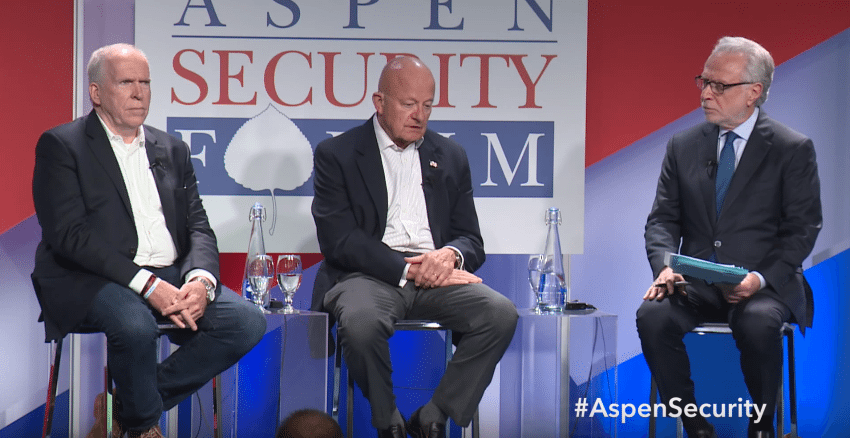
James Clapper and John Brennan came off as brutally honest and seemed to hold nothing back on questions concerning President Trump and his associates. At one point Clapper quipped: “Sometimes I wonder whether Trump is about making Russia great again”. Wolf Blitzer questioned about the Russian collusion investigation. Both expressed confidence in special counsel Bob Mueller’s ability do his job and get to the bottom of the situation.
In response to Blitzer’s question of how risky it was for Trump’s associates to meet with the Russians, Clapper, who has served every president since John F. Kennedy, reminded the audience that he was a Cold War warrior, so that might influence his thinking. According to Clapper, “maybe I’m not the most objective observer here but I think Russia is an existential threat to this country.” To Clapper, it looked like standard text book spy tradecraft. Russia was exploring to see if there was interest, while at the same time careful to create a situation where they would have plausible deniability.
“And, by the way”, Clapper added, “just for good measure, they’ve in violation of the INF treaty. So Russia is an adversary, that’s all there is to it, and they are going to do everything they can to undermine us.”
Brennan said he found it profoundly baffling why people from the Trump campaign would want to meet with people from Russia to get dirt on Hillary Clinton. He said it raised obvious questions and they should have known better. If they didn’t, they should not have been in that position. I interpreted that to mean they were not qualified for their jobs.
If Mueller is fired, I hope our elected reps will stand up & say “enough is enough," says Fmr CIA Director Brennan at #AspenSecurity pic.twitter.com/i2IVryBOT5
— Aspen Security Forum (@AspenSecurity) July 21, 2017
As to the issue of President Trump meeting Vladimir Putin at the recent G20 conference with only a Russian interpreter present, Clapper expressed concern. He stated that Trump not having a witness or his own translator was a bothersome thing. When asked if, to their knowledge, a President had ever met with another country’s leader without having his own translator, Brennan said there may have been another instance, but he wasn’t aware of a President relying on a Russian translator – you don’t know what the translator told Putin.
Brennan also questioned the validity of Trump’s explanation of the meeting. According to Brennan, the President’s account of the meeting may not be what happened, as he has a history of doing just that. Brennan also said it made his blood boil when Trump made the “it was a great honor to meet” comment about Putin. He didn’t think it was the honorable thing to do. Brennan explained, “this is Mr. Putin who assaulted one of the foundational pillars of our democracy, our electoral system, that invaded Ukraine, annexed Crimea, that has suppressed and repressed political opponents in Russia and has caused the deaths of many of them.” Brennan, who has served with six presidents, added that for a person “who supposedly knows the art of the deal I thought it was a very, very bad negotiating tactic.”
As to the issue of US vulnerability to future Russian attacks on our elections, Clapper reiterated they will be back, and the next time their target could be a Republican candidate. He pressed the need to defend ourselves against assaults to our system.
Blitzer raised the question of Trump’s denial of the Intelligence Community’s conclusion. Both Clapper and Brennan stood firm, expressing confidence in the intelligence community assessment that the Russians did in fact meddle in the 2016 election.
Throughout the conference, moderators raised the question of Russian meddling to most of the speakers, especially those currently working for the government. So far, everyone has stated they believe the report to be accurate, including new CIA director Mike Pompeo. Brennan said it was the job of the intelligence professional to give their best analysis and sometimes there may be a situation where it’s an inconvenient truth.
The national security apparatus is bigger than one person, even the President. -Fmr DNI Clapper #AspenSecurity LIVE: https://t.co/DBgE8Aynzk pic.twitter.com/ciScEhtcbF
— Aspen Security Forum (@AspenSecurity) July 21, 2017
Blitzer asked if President Obama had “choked” over his handling of the Russian hacking of the elections. Clapper said he had learned over time it was easy to do the “woulda, shoulda” thing, but you can never go back to duplicate all the events and thinking that caused people to make decisions at the time. According to Clapper, “you can never ever go back and recreate exactly the contemporaneous environment that led people to make the decisions they made.”
Clapper reminded Blitzer of the 7 October statement of former Homeland Security Director, Jeh Johnson warning of Russian Hacking activity. The event did not garner the attention it should have because it came out the same time as the Access Hollywood story on Trump (or as Clapper jokingly called it, “Excess Hollywood”) and his “locker room” comments. According to Clapper, “that emasculated what was really an important message to the American electorate.”
Clapper said they did see the Russians doing reconnaissance on voter systems. He initially saw them active in 21 states, but ultimately it was up to 39.
They didn’t go into much detail about our response, but said President Obama told Putin to stop it and Brennan said he also talked to his Russian counterpart. Clapper added, “and of course we did do the sanctions on the 29th of December which I always considered a good first step, and we were all hopeful that the next administration would pick that up and follow up on the measures we took.”
Brennan explained, “now President Obama could beat his chest and say the Russians are trying to get Mr. Trump elected, [but] I don’t think that would have went over well in many areas because he is the head of the Democratic Party.” Brennan added, “so [Obama was] trying to balance this and trying to prevent the Russians from doing what they were trying to achieve.” Brennan expressed belief that in the end their response made sure the Russians did not do all that they could have done.
Clapper added that another factor that weighed on the decision was that “if we make a big thing of this”, if the President made a primetime television address to the nation, it would “only serve to hype, magnify or amplify what the Russians were doing or dignify it.” Clapper explained that there was also the concern “about putting a hand on the scale” in favor Hillary Clinton as opposed to Donald Trump.
Brennan added that “there is no playbook to this”, suggesting that perhaps there should be a requirement in the future that 120 days before all presidential and congressional elections, the director of National Intelligence and a director the FBI “should say exactly what’s the state of cyber intrusions that are designed to compromise the integrity of the electoral system.”
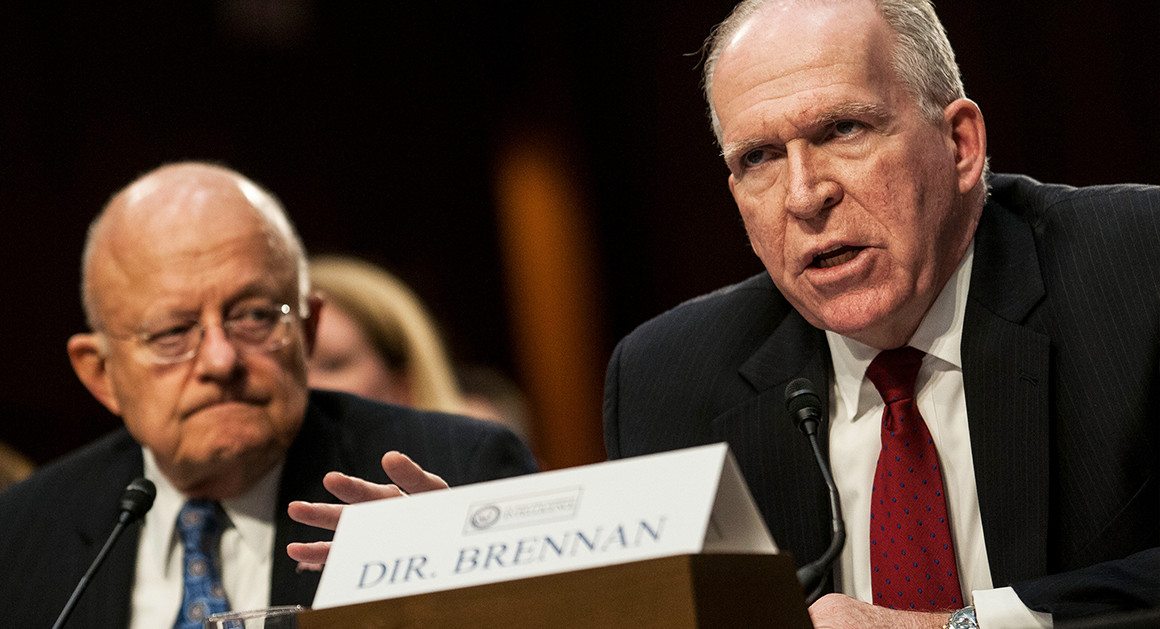
When asked about their response to some of the negative comments Trump has made about the intelligence community, Clapper said he called Trump after he called intelligence types “Nazis”. He felt it was inappropriate and he had to do something about it. Brennan called the comments disgraceful.
Clapper expressed the difficulty he had in confronting Trump. “[I] spent 34 years in military, two combat tours in Vietnam. So my instincts are, professional instincts are loyalty to the president’s commander in chief … So it’s very hard, very, very painful for somebody like me to speak like this. And I think that in itself is sad commentary.”
I can’t ever recall an instance where recently retired senior intelligence officials have spoken so bluntly about a sitting President.
The President’s Principal Briefer
I found the session with the new Director of National Intelligence, Daniel Coats, very informative. Under questioning from Lester Holt, Coats said he was the President’s principle briefer and the focus is on what happened overnight. The CIA Director, the Vice President, and Thomas Bossert, Assistant to the President for Homeland Security and Terrorism are also present at such briefings, and he had the heads of NSA and NGA give the President a briefing on their capabilities. Coats said Trump is a constant “consumer of information” and asks lots of questions, saying many complimentary things about the intelligence community.
Holt asked if there was dissent within the Intelligence Community on the Russian election hack. Coats assured there was no dissent, and pointed out that not all 16 intelligence agencies had a mission that would cause them to focus on those issues.
During my intelligence career I had to review and comment on lots of intelligence community documents, like National Intelligence Estimates. If a particular document topic had no relevance to naval intelligence or joint intelligence issues I wouldn’t spend much time on it. That did not mean I didn’t think it was important, only that it had little relevance to the mission I was supporting. You’re literally looking at thousands of things you need to monitor and read each day so you have to choose carefully what you spend your time on. The stuff is usually classified so it’s not like you can take it home for bedtime reading.
“We understand that American involvement, to some extent, needs to be there.”–@ODNIgov Coats when asked about America First. #AspenSecurity pic.twitter.com/W6nNoh6q4q
— Aspen Security Forum (@AspenSecurity) July 22, 2017
The conversation turned to the recent North Korean ICBM launch. Coats said the launch indicates North Korea is making progress on achieving ICBM capability that potentially could reach the United States. Without going into detail, he said we have great tools that tell us what the bad actors are doing. He pointed out the intelligence professionals are doing remarkable things in a classified environment so he could not provide more details.
In response to a Holt question, Coats said he did not believe Kim Jong-un is crazy, there is a rationale for his actions. The North Korean leader has seen that having nuclear weapons gives you some options. “The lessons that we learned out of Libya giving up its nukes and Ukraine giving up its nukes is unfortunately if you had nukes, never give them up. If you don’t have them, get them, and we see a lot of nations now thinking about how do we get them and none more persistent than North Korea.” Coats also clarified the thing that most worries him is WMD married up with a terrorist group. “Consequence of those two planes flying into the towers of New York bearing a weapon of mass destruction, the casualty numbers that occurred from those two strikes would have a lot of zeros behind it.”
Coats also discussed the fate of ISIS, stating “we’re putting a stake in the heart of ISIS … but it’s like putting a stake in an octopus with all the tentacles moving out to different places, ungoverned states around the world.” Coats believes this is a long-term threat “with significant support capacity and resources that we’re going to have to deal with for many years.”
In response to a question on technology threats, Coats remarked that we’re in a chess game. Threat actors have a capability to use new technology in an adverse way. According to Coats, “technology is advancing so quickly and so sophisticated … it’s just a simple game of chess as everyone’s racing to use that technology for adverse purposes and inflict harm.” Coats expressed general frustration that we’re having a hard time adapting to technological capabilities because of our cumbersome acquisition process. According to Coats, “we’ve got to be more agile”, “we’re part of a large bureaucracy” where a request “goes through a fairly tortuous process” through Congressional and appropriations channels. Coats added, “we’ve got to find a way that we can adapt to these technology changes and through the intel — get some kind of authorities in the intelligence community to do this faster, better, and stay in front of the game or we’re going to pay a price.”
What keeps @ODNIgov Director Coats up at night?
Weapons of mass destruction and terrorist groups getting access to them. #AspenSecurity pic.twitter.com/OU7aN2xd7S— Aspen Security Forum (@AspenSecurity) July 22, 2017
Holt asked Coats how our America First policy was playing overseas. Coats said he’d done a bit of travel and there are concerns whether America can still be counted on. “I would say there’s a question mark relative to are you guys with us, do you have our back, and they ask that because they know they can’t go alone.” Coats added, “if we’re going to address the problems of the world in a way that best protects our nation”, we must also do so “with the understanding that we cannot be the world’s policeman.” Coats exclaimed, “I’m telling [our allies] we’re only going to solve this problem if we engage together.”
As to Syria, he said there was “just chaos” and it was very difficult to predict the future. On the potential for a Cyber 9/11 he said he thinks we’re behind the power curve but a lot of emphasis is now being placed on protection of our critical infrastructure. He also said he thinks we need both an offensive and defensive cyber strategy.
Think I’ll end here.
Gail Harris, Lima Charlie News
[Edited by Anthony A. LoPresti]
Captain Gail Harris (U.S. Navy, Ret.), was the highest-ranking African American female officer in the US Navy at the time of her retirement in 2001. Her 28 year career in intelligence included hands-on leadership during every major conflict from the Cold War, to El Salvador, to Desert Storm, to Kosovo, and she was at the forefront of one of the Department of Defense’s newest challenges, Cyber Warfare. Gail also writes for the Foreign Policy Association, is author of “A Woman’s War”, serves as Senior Fellow for the George Washington Center For Cyber & Homeland Security and is a Senior Advisor for the Truman National Security Project.
Follow Capt. Harris on Twitter @GailHarrisLC
Lima Charlie provides global news, insight & analysis by military veterans and service members Worldwide.
For up-to-date news, please follow us on twitter at @LimaCharlieNews
Full video here:
In case you missed it:

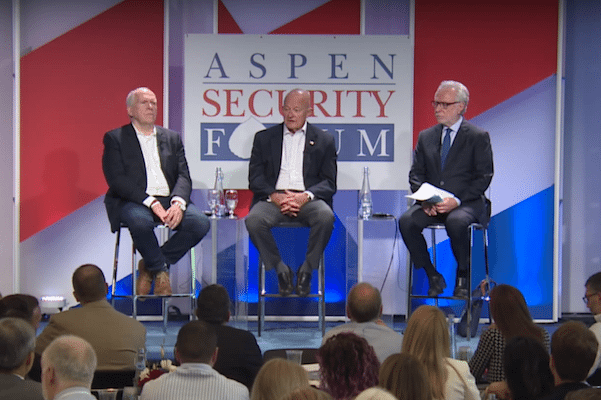
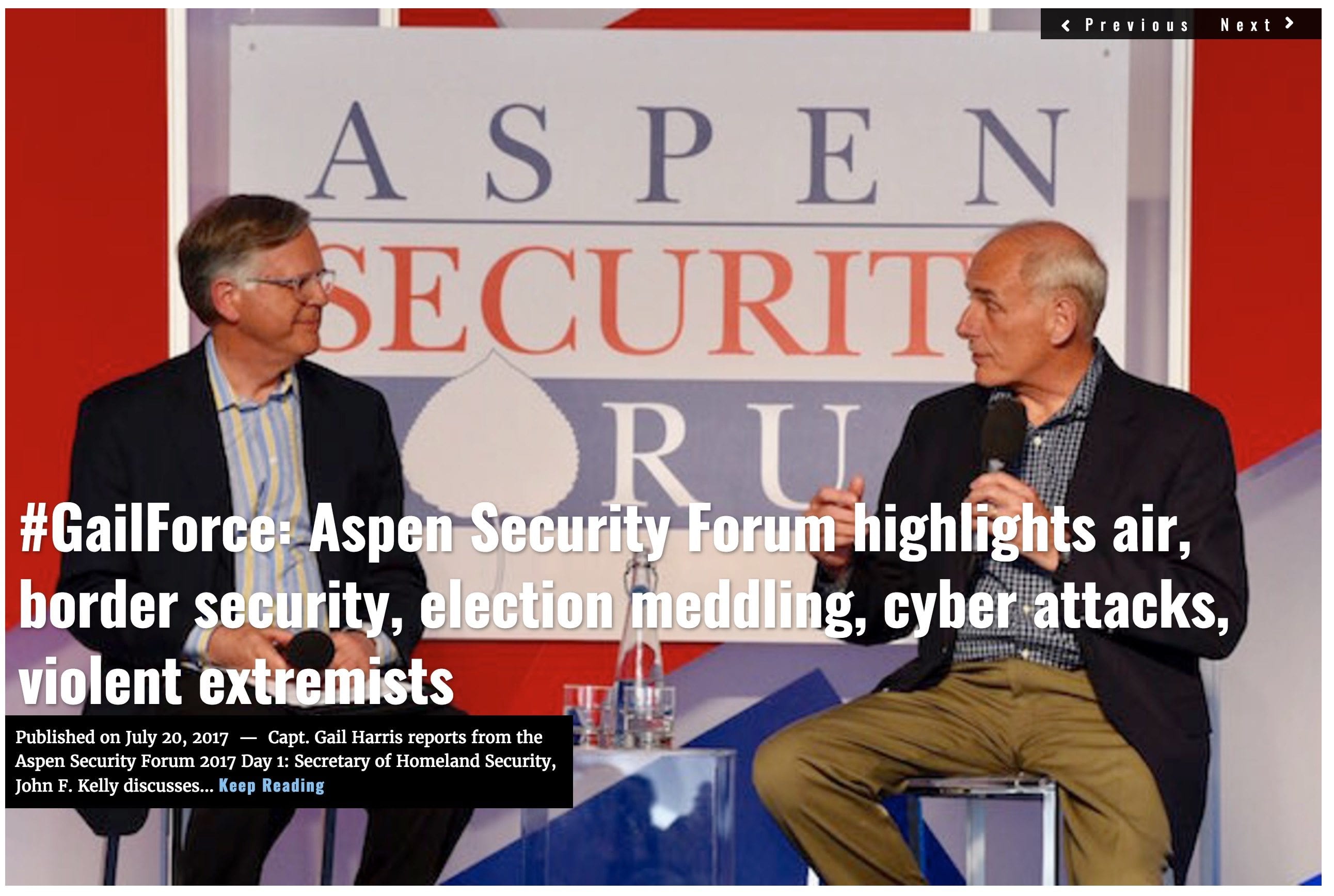
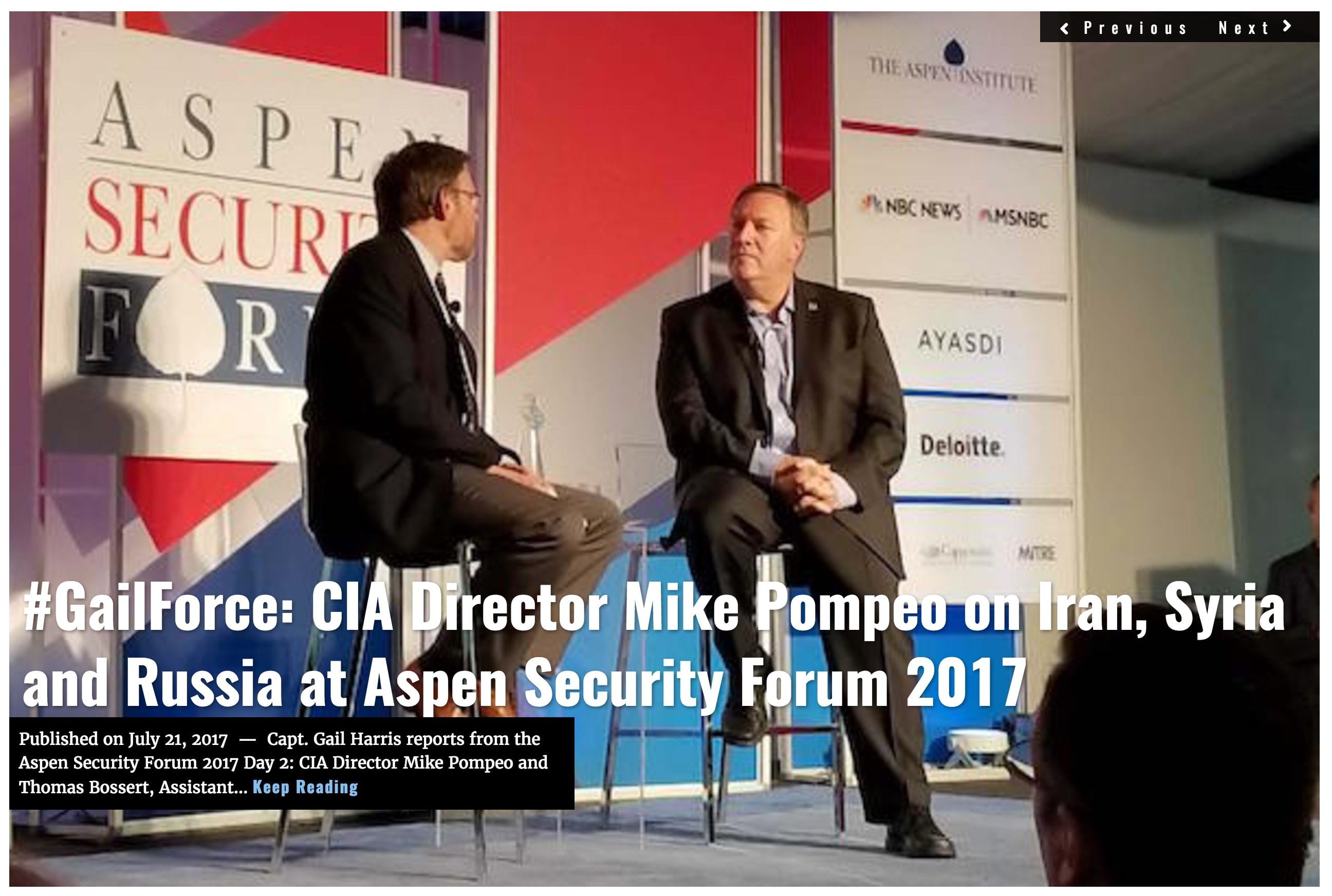
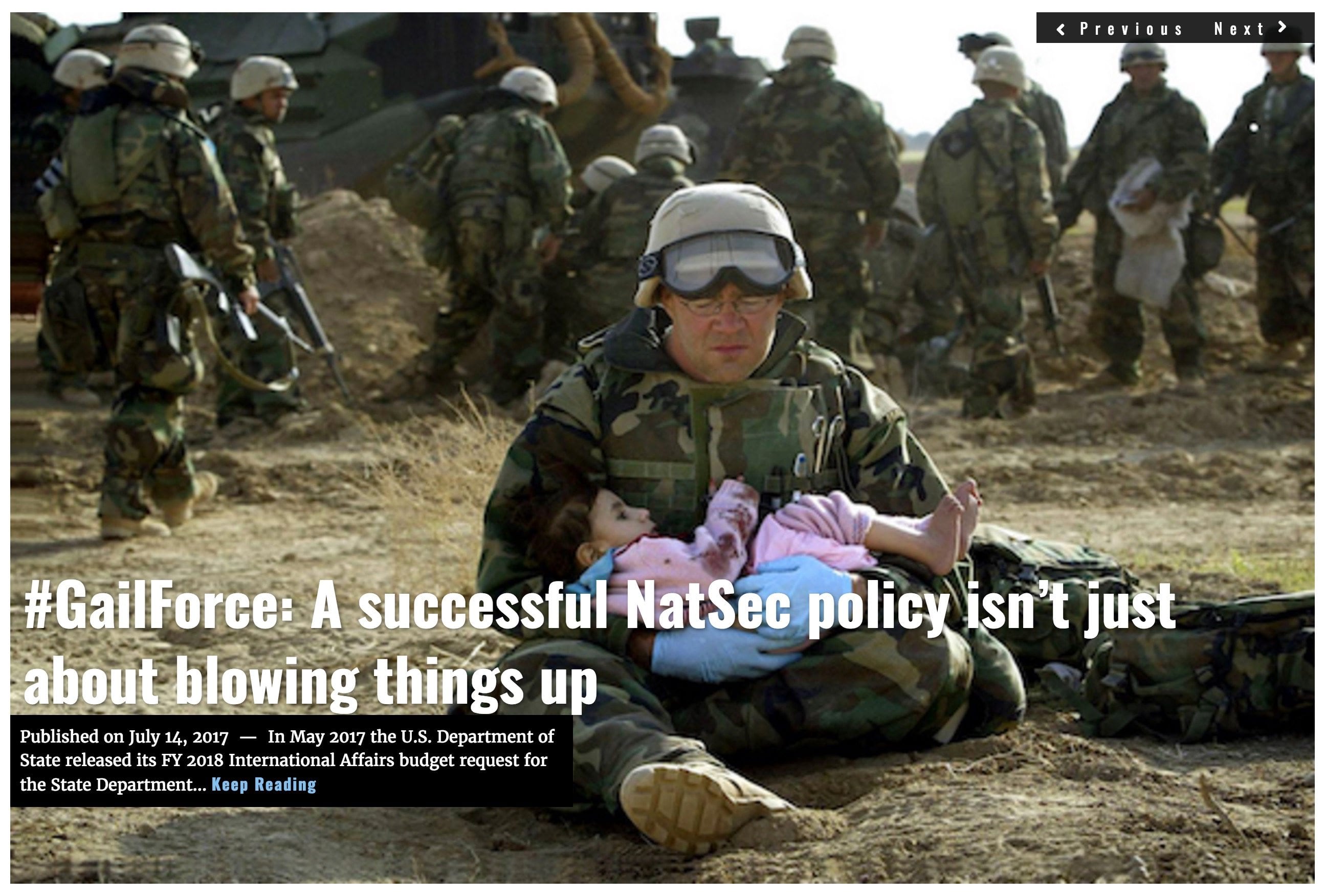
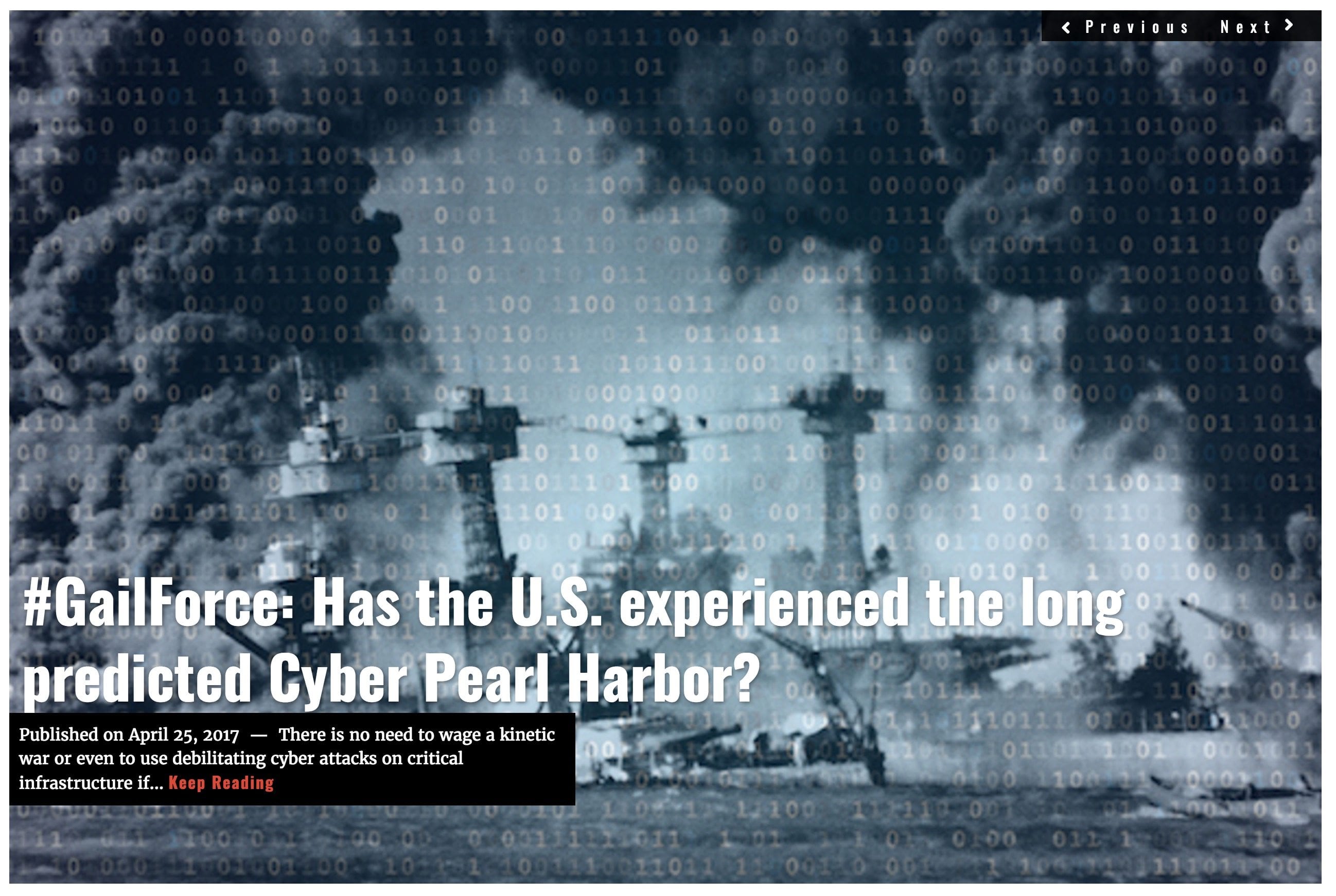
![Image GailForce to Space Force: 'Make it so' - the Space Force debate continues [Lima Charlie News]](https://limacharlienews.com/wp-content/uploads/2019/05/Space-Force-01-480x384.png)
![Image War in Eastern Ukraine and the New Heroes of ‘Novorossiya’ (New Russia) [Lima Charlie News]](https://limacharlienews.com/wp-content/uploads/2019/04/Donbass-MAIN-01-480x384.png)

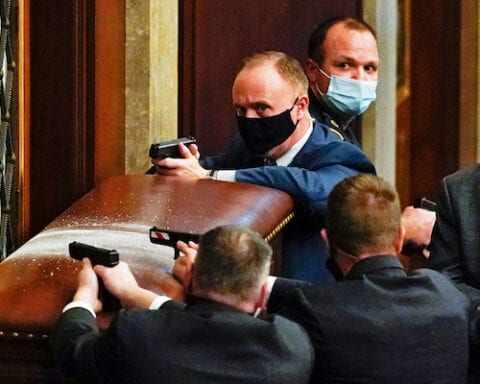


![Image Memorial Day may soon be a remembrance of democracy and those who had the courage to defend it [Lima Charlie News]](https://limacharlienews.com/wp-content/uploads/2018/05/Memorial-Day-may-soon-be-a-remembrance-of-democracy-and-those-who-had-the-courage-to-defend-it-Lima-Charlie-News-480x384.png)
![The Mind of Bolton - AUMF and the New Iran War [Lima Charlie News]](https://limacharlienews.com/wp-content/uploads/2019/05/Inside-the-mind-of-Bolton-Lima-Charlie-News-main-01-480x384.png)
![Image GailForce to Space Force: 'Make it so' - the Space Force debate continues [Lima Charlie News]](https://limacharlienews.com/wp-content/uploads/2019/05/Space-Force-01-150x100.png)
![Image War in Eastern Ukraine and the New Heroes of ‘Novorossiya’ (New Russia) [Lima Charlie News]](https://limacharlienews.com/wp-content/uploads/2019/04/Donbass-MAIN-01-150x100.png)